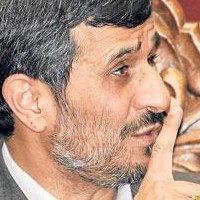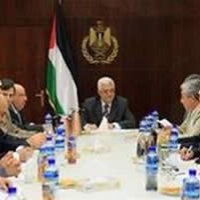![]()
Sun, Oct 02, 2011 | The Meir Amit Intelligence and Terrorism Information Center
Confusion in Iran over Palestinian UN bid
The Iranian media reactions to the Palestinian UN bid exemplified the confusion in Tehran over the Palestinian appeal for international recognition of independent statehood within the June 1967 borders.
Earlier this week the Asr-e Iran website discussed the complexity of the Iranian stance on the Palestinian UN bid and the contradictory positions of top Iranian officials on the issue. According to the website, this complexity was reflected in the statement made by President Ahmadinejad to journalists in New York, saying that Iran recognizes the establishment of an independent Palestinian state as a first step towards the complete liberation of Palestinian territory.
On one hand, Iran has always stressed the need to liberate all of Palestine, and it is not willing to accept most of historic Palestine remaining in Israel’s possession. Support for the Palestinian appeal for recognition, Asr-e Iran said, could be interpreted as dropping the demand for the liberation of the entire Palestine and being willing to settle for a smaller Palestine within the 1967 borders. Such support may also reinforce the status of Abu Mazen vis-à-vis Hamas, Iran’s partner. On the other hand, by opposing the Palestinian bid, Iran can be seen as siding with the United States and Israel, two countries that oppose the Palestinian demand (Asr-e Iran, September 24).
The reformist daily E’temad also argued that the Palestinian UN bid poses a problem for Iran, since supporting it means recognizing the existence of the State of Israel. Iranian officials must make a decision about Iran’s stance on the issue and address the implications stemming from it with regard to UN Security Council resolutions 242 and 338. If Iran recognizes a Palestinian state within the 1967 borders, it may be perceived as a change in its regional policy. On the other hand, opposing the Palestinian UN bid may weaken Iran’s political position among the nations of the region.
The government of Iran hopes, according to E’temad, that the United States will veto the Palestinian appeal. Such a veto will derail what is for Iran a problematic plan and weaken the position of the United States in the Middle East. The daily argued that recognition of a Palestinian state by the UN will signal a new age for the region, whose significance will outweigh even that of the recent developments in the Arab world. It is a development that will require Iran to reexamine its regional policy (E’temad, September 25).
Meanwhile, two members of the Majles National Security and Foreign Policy Committee voiced reservations about the Palestinian UN bid. Majles member Heshmatollah Falahatpisheh branded the Palestinian UN bid as an American-Israeli conspiracy designed to divert the attention of the region’s nations from the anti-American and anti-Zionist uprisings in the Arab world. The popular Islamic uprisings in the region have entered their anti-Zionist phase, Falahatpisheh said, and will likely turn against the American presence in the region in the third phase. The Palestinian UN bid was designed to create differences of opinion among the region’s nations and divert their attention from the anti-Zionist and anti-American campaign to the issue of the establishment of an independent Palestinian state (Fars, September 24).
In an editorial published by the Majles member in the conservative daily Resalat, Falahatpisheh argued that, in any case, the United States and Israel will not allow the establishment of an independent Palestinian state that will turn into a base for the mobilization of anti-Zionist movements in the Middle East. The actors working behind the scenes of the Palestinian UN bid want to sway the revolutionist and anti-Zionist movements in the region from their chosen path and strengthen Israel (Resalat, September 25).
Majles member Parviz Sarvari also voiced reservations about the Palestinian UN bid, saying that it will only strengthen the regional position of Israel and the United States. He argued that, with the Palestinian UN bid, Israel seeks to transform the Israeli-Palestinian conflict into one that is purely domestic (Palestinian) and reinforce the position of Mahmoud Abbas in light of the increasing support for Hamas among Palestinians (Fars, September 24).
The conservative daily Jomhuri-ye Eslami was also critically opposed to the potential recognition of an independent Palestinian state within the 1967 borders. An editorial titled “Only one government in Palestine” said that if the proposal brought up by Mahmoud Abbas had included a statement calling for just one state and government in Palestine, his plan could have been defended. As it currently stands, however, his proposal includes recognition of the existence of a Palestinian state alongside the State of Israel, and the establishment of two states and two governments in Palestine. The plan, therefore, is illegitimate, and the Palestinian people do not accept it.
Adopting Abu Mazen’s plan is tantamount to recognizing Israel’s existence, which serves the purpose of the Zionists to gain recognition from the Palestinian people. In addition, it promises to the Palestinians sovereignty in just one small part of Palestinian land. Such a plan goes against history, which proves that “Canaanite Arabs” were the rulers of Palestine as early as in 2500 BC, and that it was only 700 years later that the Jews came to Palestine from Egypt, only to leave once again. The establishment of a state named Israel for the Jews is a Zionist conspiracy created less than one hundred years ago with the support of the United States and the other colonial powers, primarily Britain. The Jews have no right for sovereignty in Palestine. According to the daily, the Palestinian UN bid is an American-Zionist conspiracy to gain control of the storm that is shaking the foundations of the “Zionist regime” in light of the developments in the Arab world. The best way to protect Israel is through Abu Mazen’s initiative to establish a Palestinian state, which will make recognition of the Zionist regime possible by deceiving public opinion. Jomhuri-ye Eslami said that the threat made by the United States to veto the Palestinian appeal and PM Netanyahu’s opposition to Abu Mazen’s initiative are just a tactic for the furtherance of the conspiracy, whose long-term goal is the implementation of Abu Mazen’s plan, which will help the Zionist regime out of its current predicament.
The correct policy towards the Palestinian issue is based on the principle that all of Palestine belongs to the Palestinians, and that Zionists do not belong there. The struggle against the Zionist regime must continue until the complete liberation of Palestine, where only one government should rule based on the wishes of the Palestinian people, the daily said (Jomhuri-ye Eslami, September 25).
A different approach to the Palestinian UN bid could be seen in an editorial published by the daily Shargh. The reformist daily argued for unconditional support for the Palestinians’ rights on the international scene, saying that support for the independence of Palestine also serves Iran’s national interests. International recognition of two independent states, Israel and Palestine, will have no significant change as far as Iran is concerned, seeing as Israel is already recognized by most countries in the world and Iran’s position towards it will not change. Even if the establishment of an independent Palestinian state will not solve all the issues of the Israeli-Arab conflict, it will boost the Palestinians’ ability to realize their demands and rights (Shargh, September 26).
Another editorial published by Shargh criticized President Obama’s position on the Palestinian appeal for international recognition. The daily argued that there’s no difference between Obama and Bush, and that both presidents are willing to ignore the wrongs committed by the Jews against the Palestinians to get more votes. Any person or government that for any reason or argument opposes the establishment of a Palestinian state can never be called “a friend of Palestine”, Shargh said (Shargh, September 25).



 RSS
RSS











Confusion in Iran over Palestinian UN bid | Middle East News, Articles, Background, Opinion, Analysi http://t.co/dIYmO0iS
Confusion in Iran over Palestinian UN bid | Middle East News, Articles, Background, Opinion, Analysi http://t.co/dIYmO0iS